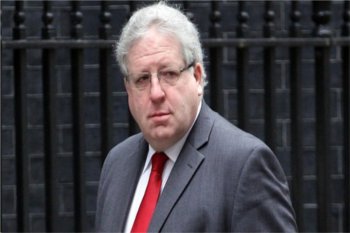The transport secretary has hinted that duty on diesel may rise to combat the fuel’s contribution to toxic air pollution, while a decision on a new runway in south east England may be delayed again.
In an interview with the London Evening Standard, Patrick McLoughlin said the Labour Government’s decision in 2000 to cut the tax was ‘a mistake’. He said: ‘We have got to look at that. It is something the Chancellor will need to look at in due course.’

Patrick McLoughlin has been transport secretary since 2012
The cut in duty on diesel led to an increase in registrations of diesel cars, which are responsible for a significant amount of toxic nitrogen dioxide (NO2).
The Government’s plans for Clean Air Zones in five English cities by 2020, the centrepiece of its national Air Quality Plan, include measures to reduce the use of some diesel vehicles but do not cover private cars.
Mr McLoughlin also suggested that ministers may again delay a decision on the Airports Commission’s recommendation that a new runway be built at Heathrow.
He said: ‘It may or may not be possible to get a decision before the House rises in July.’
Last December, the Government delayed its decision on the issue, citing the need for further environmental assessments, including the impact on air quality.
In a separate development, the Transport Select Committee has published a letter from minister Robert Goodwill, which calls on the European Commission to regulate more tightly the use of temperature dependant exhaust gas recirculation (EGR) systems.
In the letter in April, Mr Goodwill said the Government’s recent testing of NOx (nitrogen oxide and dioxide) emissions from popular diesel cars found wide-scale use of EGR systems 'that operate on significantly differing basis between manufacturers’.
EGR systems were found to be responsible for a significant difference between emissions in laboratory tests and those in real world driving. Mr Goodwill suggested that ‘reducing the amount of EGR can have significant negative impacts on NOx emissions’.
He added: ‘The Real Driving Emissions testing is a valuable and significant contribution to reducing emissions but we are sure that changes to the core regulations are needed to ensure the type approval system [for EGR] is completely robust.’
Register now for full access
Register just once to get unrestricted, real-time coverage of the issues and challenges facing UK transport and highways engineers.
Full website content includes the latest news, exclusive commentary from leading industry figures and detailed topical analysis of the highways, transportation, environment and place-shaping sectors.
Use the link below to register your details for full, free access.
Already a registered? Login